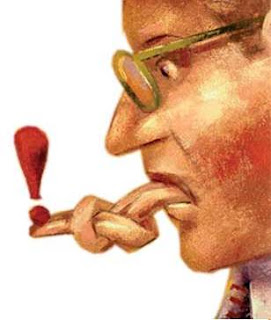 0740 hrs, Monday morning. I was getting prepared to read the thought for the day, followed by the morning prayer to the entire convent school (approx 2000 students, from Kindergarten to class 12th). My hands and legs were shivering to the extent that I started imagining myself collapse on the stage. This imagination led to fumbling, mispronunciation, stammering, perspiration (in the month of December) and in reality, a disaster. Well, I reached class late, as the principal obviously wanted to 'appreciate me for my skills as a speaker'. Guess what...instead of repremanding and shouting at me, she shared few tips on how I can confront an audience fearlessly.
0740 hrs, Monday morning. I was getting prepared to read the thought for the day, followed by the morning prayer to the entire convent school (approx 2000 students, from Kindergarten to class 12th). My hands and legs were shivering to the extent that I started imagining myself collapse on the stage. This imagination led to fumbling, mispronunciation, stammering, perspiration (in the month of December) and in reality, a disaster. Well, I reached class late, as the principal obviously wanted to 'appreciate me for my skills as a speaker'. Guess what...instead of repremanding and shouting at me, she shared few tips on how I can confront an audience fearlessly.I started putting these tips to use and no points for guessing who won most elocutions and debates in school and college. I would like to share few of these tips with you (not tricks), if you still fear PEOPLE while speaking.
- Prepare your speech several times till you are so comfortable with the content, that you can avoid reading from your notes.
- Video record your speech while practicing.
- Chew some gum before your presentation. It helps in relaxing your mouth muscles
- Do shoulder and neck rolls
- Know your room (size of the room, use of a microphone required or not, etc...)
- Go to the restroom before your speech. I know this sounds funny; however, releasing yourself can help in releasing your stress level as well
- Place your palms under running tap water. The water will ease you of your tension.
- Look at the mirror and admire the beautiful person you are. If you see only the perspiration, wash your face with running cold tap water. you will feel better.
- Take a deep breath at least 3-5 times as soon as you see the auditorium getting packed.
- Remove focus from yourself to the audience...remember they are there to listen to you
- Remember, the most challenging and crucial time is the first minutes of your speech, so do not start with your speech directly. Start with a personalized story, analogy, audio, video or quote. you will be more relaxed thereafter as the audience will now be on your side.
- Make the speech conversational, as if you were talking to a group of known folks. Involving them will make them like you more....indirectly you are motivating yourself.
- When on the stage, use the entire space that has been provided to you. Walk across the stage (not too frequently), so that you cover all sides of the audience.
- Remember to be enthusiastic. If you are dull, the audience will be dull. You attitude is highly contagious.
- Picture the audience in their underwear
- Remember happy moments from your past
- Listen to the music of your choice
- Put pictures of your kids / girlfriend / parents / grandchildren in your notes
- Do not consume caffiene before the speech delivery
- Shake hands and smile with the audience before the programme
- Try not to hold the microphone with your hands during the first 5 minutes
- Make eye contact with the audience. Connect with them. get them to nod their head to acknowledge whatever you say.
- Locate a friend in the audience, whose smile will encourage you to speak better.
- The larger the audience, the larger ansd slower your gestures
- Let your words trigger your actions. Eg. if you are counting, hold out your fingers, etc...
- While speaking, remember to pause at the right places and stress at the right words.
- Dress smartly, for the occasion.
- Do not hold anything in your hands, as you will end up fidgeting with it all the time, resulting in distracting your audience.
- Lastly, remember, you know a lot more than the audience, that is why you are where you are.
Murphy's law states that if something has to go wrong, it will. The best way to combat this, is to follow the 3 P's - Practice, Practice, Practice. If you fail to prepare, remember, you are prepared to fail.
